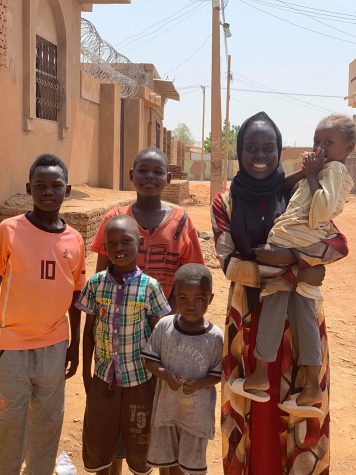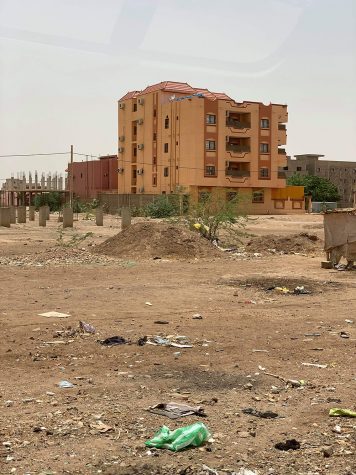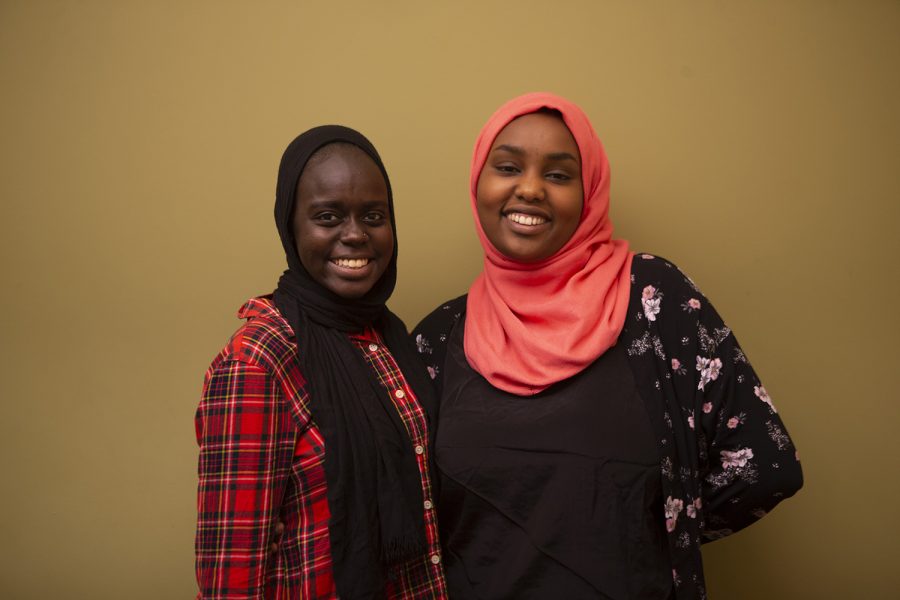UI student describes her trying times in Sudan during protests
Amani Ali, a Sudanese-American UI student, relates the story of her return to Sudan in the midst of conflict.
Amani Ali (left) and Salma AshShareef (right) pose for a portrait in the Iowa City Public Library on July 18, 2019. (Emily Wangen/The Daily Iowan)
July 23, 2019
Sudan has made headlines worldwide for its year of protests and the violent response to those protests by the Sudanese interim government. The effects of that conflict have been felt all over the world, including the University of Iowa.
Amani Ali, a Sudanese-American student attending the UI, she traveled across the globe to spend a month in her home country. It was her first time back in Sudan since her family moved to the U.S. in 2004, and she said her return was a shock.
Ali’s family came to the U.S. as refugees in the wake of the Darfur genocide, which started in 2003. Upon her return to Sudan, she said, she was disheartened to see that very little had changed.
“In 15 years, you think a country would move forward with better infrastructure, better hospitals, better everything, but sadly, that’s not the case for Sudan,” Ali said.
The UI student stayed with her extended family in Al Haj Yousif, a neighborhood in the region of Khartoum North, close to the height of government protests in Khartoum city, the capital of Sudan. Although she stayed away from the protests, exploding bombs and gunfire were common in her neighborhood.

In April, the Sudanese Armed Forces ousted Omar al-Bashir, the country’s dictator for the past 30 years, after massive protests against rising food costs and fuel shortages. A military coup pushed al-Bashir out, making way for a military council, which was supposed to be a transitional government. As negotiations for civilian-backed democratic elections broke down, protests started again and were met with violence.
In May, when Ali arrived in Sudan, the protests against the interim government were not as violent as they eventually became during the month. Military and police stalked her neighborhood, and they threw explosives, causing smoke to fill Ali’s house and making it difficult to see and breathe. The internet blackout kept her from communicating with her friends back home for nearly three weeks.
When Ali heard gunfire and explosions rattle the neighborhood for the first time, she thought she was going to die.
She was shocked to see how accustomed her extended family had become to a level of violence that to her was completely alien. Fatima Saeed, a member of the Sudanese community in Iowa City, in a June interview with The Daily Iowan described the kind of violence the military and police inflicted on protesters and people just going about their day.
“They’ve been using heavy machine guns to kill people,” Saeed said. “Some people get burned, some are thrown into the Nile.”
RELATED: Iowa City’s Sudanese population calls for U.S. response to Sudan crisis
Ali is a UI premed student and a Global Health Studies major. After medical school, she hopes to return to Sudan as a physician and help build hospitals, because proper medical care is scarce.
Fellow UI senior Salma AshShareef, although she did not visit this summer, travels to Sudan around every three years, and she saw the lack of progress over the years for herself.

Instead of visiting Sudan this year, AshShareef was able to partake in one of the demonstrations by the Sudanese community in Iowa City and Coralville. She said that while practically they didn’t do much, it did have the benefit of showing the people of Sudan they were standing in solidarity.
“I took up the megaphone for the first time and started speaking,” AshShareef said. “It’s important for us to keep going, because this has been going on for several months now, and you know how things lose momentum. I was just trying to encourage everyone.”
Iowa City Councilor Mazahir Salih traveled to Sudan this summer for vacation.
Back in the U.S., the thought of friends and family still in Sudan weigh on Ali and AshShareef. While they’re able to communicate with their friends until most of them return to Iowa City in August, they still worry about their health and well-being.
Ali also thinks about the environment her younger cousins are growing up in. She said her cousins, some of them as young as 6, can name all of the guns that the police use and have been taught the basics of defending themselves.
“What if they don’t get to go to preschool, what if they don’t get to go to high school, what if they don’t get to graduate college?” Ali said. ”They’re still young, and I don’t think kids should experience that.”
While the violence in Sudan has settled with a ceasefire between the interim government and protesters, Ali fears that the calm will foreshadow an even more intense conflict.
Update: In an email to The Daily Iowan, Salih confirmed that she is hoping to be back in Iowa City on July 28.



